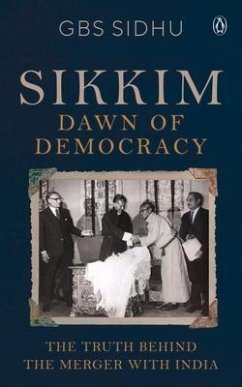It was in 1973 that G.B.S. Sidhu, a young official with the newly set-up Research and Analysis Wing (R&AW), took charge of the field office in Gangtok in 1973. With an insider's view of the events that led to the Chogyal's ouster, he presents a first-hand account of the fledgling democracy movement and the struggle for reforms led by Kazi Lhendup Dorji in a society that was struggling to come to terms with the modern world. In his fast-paced, clear-sighted narrative, Sidhu tracks the reasons behind New Delhi's shift from a long-standing pro-Chogyal stand to a pro-democracy position and maps the political alignments on the ground in Sikkim. He outlines the interplay of personalities-Indira Gandhi, the Chogyal, the Kazi, and the Indian officials and intelligence agencies involved-to reveal the chain of events that led to the merger of the Himalayan kingdom with India.Read more








